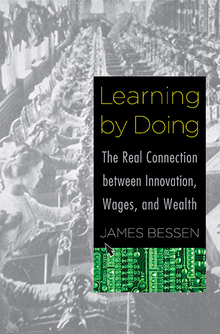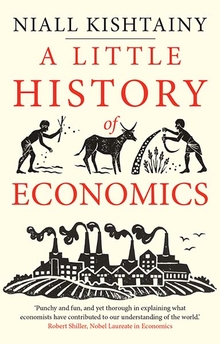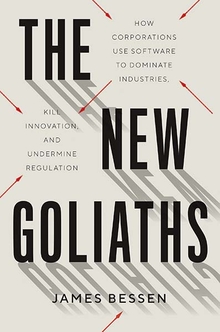Learning by Doing
WARNING
You are viewing an older version of the Yalebooks website. Please visit out new website with more updated information and a better user experience: https://www.yalebooks.com
The Real Connection between Innovation, Wages, and Wealth
James Bessen
An important study of the relationship between technology, skills, and economic inequality that answers some of the most pressing economic questions of our time
Today’s great paradox is that we feel the impact of technology everywhere—in our cars, our phones, the supermarket, the doctor’s office—but not in our paychecks. In the past, technological advancements dramatically increased wages, but for three decades now, the median wage has remained stagnant. Machines have taken over much of the work of humans, destroying old jobs while increasing profits for business owners. The threat of ever-widening economic inequality looms, but in Learning by Doing, James Bessen argues that increased inequality is not inevitable.
Workers can benefit by acquiring the knowledge and skills necessary to implement rapidly evolving technologies; unfortunately, this can take years, even decades. Technical knowledge is mostly unstandardized and difficult to acquire, learned through job experience rather than in the classroom. As Bessen explains, the right policies are necessary to provide strong incentives for learning on the job. Politically influential interests have moved policy in the wrong direction recently. Based on economic history as well as analysis of today’s labor markets, his book shows a way to restore broadly shared prosperity.
Today’s great paradox is that we feel the impact of technology everywhere—in our cars, our phones, the supermarket, the doctor’s office—but not in our paychecks. In the past, technological advancements dramatically increased wages, but for three decades now, the median wage has remained stagnant. Machines have taken over much of the work of humans, destroying old jobs while increasing profits for business owners. The threat of ever-widening economic inequality looms, but in Learning by Doing, James Bessen argues that increased inequality is not inevitable.
Workers can benefit by acquiring the knowledge and skills necessary to implement rapidly evolving technologies; unfortunately, this can take years, even decades. Technical knowledge is mostly unstandardized and difficult to acquire, learned through job experience rather than in the classroom. As Bessen explains, the right policies are necessary to provide strong incentives for learning on the job. Politically influential interests have moved policy in the wrong direction recently. Based on economic history as well as analysis of today’s labor markets, his book shows a way to restore broadly shared prosperity.
James Bessen, an economist, is a lecturer at Boston University Law School. He was founder and CEO of a software company that developed the first desktop publishing program.
Visit James Bessen's website here.
"James Bessen is uniquely qualified to interpret technology issues, having both rich historical expertise and startup experience. I especially like the way he demystifies the concept of skills and questions the apotheosis of college diplomas and intellectual property rights. This is one of the most hopeful yet realistic books in years."—Gavin Wright, author of Sharing the Prize: The Economics of the Civil Rights Revolution in the American South
"James Bessen’s provocative new book explores a critically important economic question: what is it that in some epochs, including today, severs the link between productivity growth and increases in the median wage? His answer, developed within a rich tapestry of historical narrative, focuses on the changing incentives faced by firms and individuals to invest in new skills and capabilities as technological systems are born, go through adolescence, and eventually mature. His analysis and policy recommendations offer many challenges to established ways of thinking."—Alexander J. Field, author of A Great Leap Forward: 1930s Depression and US Economic Growth
"Today everyone agrees that education is the key to wage growth. But what kind of education? In this enlightening and insightful book, James Bessen shows that economic history can provide some useful and surprising answers to this question."—Hal Varian, Chief Economist, Google
"James Bessen, an acute observer of economics and technology, thinks lags from learning-by-doing explain why the IT revolution hasn’t yet boosted wages. A fascinating hypothesis—and book."—Eric S. Maskin, Nobel laureate in Economics
"Mr. Bessen sets out to refute the arguments of . . . techno-pessimists, relying on economic analysis and on a fresh reading of history."—Tamar Jacoby, The Wall Street Journal
"This important book is well written, clearly argued, and makes numerous salient points regarding the interactions between technological change, skill attainment, and earnings."—J.P. Jacobsen, Booklist
"[T]his book offers rich historical detail. . . . Learning by Doing is a valuable contribution to business managers, historians, and economists alike."—Scott Alan Carson and Paul E. Hodges, Turkish Economic Review
ISBN: 9780300195668
Publication Date: April 28, 2015
Publication Date: April 28, 2015
312 pages, 6 1/8 x 9 1/4
8 b/w illus.
8 b/w illus.









